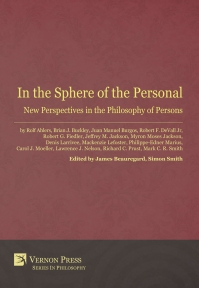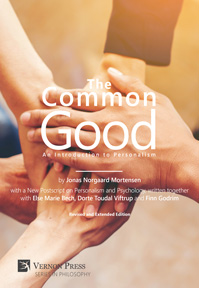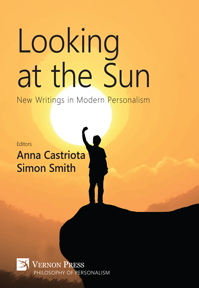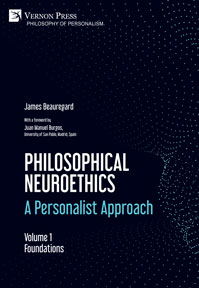The Person at the Crossroads: A Philosophical Approach
James Beauregard, Giusy Gallo, Claudia Stancati (Eds.)
by Laura J. Mueller (Gustavus Adolphus College in Minnesota), Moeller Carol (Moravian College in Bethlehem, PA), James Beauregard (Rivier University), Bianca Bellini (Università Vita-Salute San Raffaele, Italy), Marc Djaballah (Université du Québec à Montréal, Canada), Giusy Gallo (University of Calabria, Italy), Grzegorz Holub (Pontifical University of John Paul II in Krakow, Poland), Yong Lu (Cardinal Stefan Wyszyński University in Warsaw, Poland), R. T. Allen, Carlo Vinti (University of Perugia, Italy), Endre Nagy (Semmelweis University, Hungary), Spartaco Pupo (University of Calabria, Italy), Claudia Stancati (University of Calabria, Italy), Peter Reynaert (University of Antwerp, Belgium), Mateo Scozia (University of Calabria, Italy), Xiaoxi Wu (Southeast University, China), Elisabeth M. Yang (Rutgers University), Randall Auxier (Southern Illinois University Carbondale)
Purchase this book
(click here to change currency)
In the Introduction to the book, The Person at the Crossroads A Philosophical Approach, the editors describe the philosophical notion of the person as “a problem.” This idea surely is a problem, especially within the context of our culture, which looks at the world through the cultural lens of a materialistic, deterministic and reductionistic worldview … an exhausted point of view.
The exhaustion can be seen in the academy. Philosophy and literature classes are today a walking, talking disaster zone. Students sense it and vote with their feet. Why take bewildering and depressing classes. Skepticism and nihilism rules. We are, after all, mere animals in a meaningless world. Instinct rules.
The notion of person is surely a problem in this cultural wasteland as it challenges this assumption. Herein lies an opportunity. The field is deserted, the rats have fled the ship. Contemporary philosophy is toxic, but flowers like the dung. Something new is in town: personalism, a flowering of classical/perennial philosophy. It is still small and tender, but there is lots of manure around and sunlight remains.
People excited and energized. You see it in this book. Hope, beauty, truth, goodness, knowledge warm our black, little hearts, and they too are part of the unique fabric of persons, found nowhere else.
This book is nothing less than exciting. The notion of person re-energizes everything, as this book shows. But it also points to a new direction of philosophy: the terrain is perfect. Existential nihilism is so twentieth century.
Dr. James Harold
Franciscan University of Steubenville
This absorbing collection brings together a diverse set of historical and contemporary philosophical perspectives on the person, ranging from Augustine to Merleau-Ponty, from Hume to Confucius, from language to embodiment, and from resisting racism to depression and suicide. Yet in all this diversity, common themes and connecting threads give the volume real coherence as an expression of the scope and possibilities of contemporary personalist philosophy. In assembling this collection, the editors have demonstrated the breadth, and vitality of the personalist tradition. There are rich resources here for ongoing philosophical, theological and ethical reflection on the human person. Scholars and students from diverse philosophical and theological traditions, and those working on both theoretical and practical problems in ethics and related fields (including a range of issues in bioethics and health care ethics, to name just one area), should find contributions in this volume that will be of interest and inform their work.
Dr. Neil Messer
University of Winchester, UK
This book is definitively an innovative and fresh contribution to the theme of ‘person’ which has always been at the center of the philosophical debate. The major asset of this collective work lays in the variety of approaches taken when discussing the idea of ‘person’. The result is an original work that displays different approaches, interpretative models and theories. Therefore, the strength of the book is its variety which can appeal and catch the interest of a multi-faced audience. I am thinking in particular of chapter 1, chapter 8 and chapter 10; those chapters, in particular, offer interesting points of reflection and instigate to further explorative research in the themes treated. Another point in favor is that this is a book that seems to privilege the international and continental philosophical approach as shown by the selection of the book contributors. This is a very important point that together with another relevant asset of the book, namely, the attention to the Christian understanding of the concept of ‘person’, could eventually pave the way to a wider audience and in particular, a Christian- Catholic audience where the theme of ‘person’ especially under this current pontificate, has been oftentimes at the center of the theological and social doctrine of Pope Francis.
Anna Castriota
St. Clare's, Oxford
‘The Person at the Crossroads: A Philosophical Approach’ brings together scholars from around the world who share a common interest in the nature and activity of the human person. Personhood is examined from a variety of perspectives, both philosophical and theological, drawing on the rich traditions of both Western and Eastern thought. Readers will find themselves on a journey through the works of past and current scholars including, Confucius, Augustine, David Hume, Immanuel Kant, Horace Bushnell, Maurice Merleau-Ponty, Michael Polanyi, Rudolf Carnap, Karol Wojtyla, Erazim Kohak, and many other authors who touch upon the personalist tradition and the human person. This volume will be of particular interest to readers interested in the nature of the human person, as well as philosophy and theology undergraduate and graduate students and professors teaching in these areas.
From the Editors
Author Biographies
Introduction
Randall Auxier
Southern Illinois University Carbondale
Part 1
The Personal Dimension: The Thread of History
Chapter 1
Augustine of Hippo on the Concept of Person: A Philosophical Analysis
Matteo Scozia
University of Calabria, Italy
Chapter 2
Personal Identity as Political System in David Hume
Spartaco Pupo
University of Calabria, Italy
Chapter 3
The Organic Child: Horace Bushnell’s Methods of Child-Rearing in Nineteenth-Century America and its Implications for an Organic Anthropology (Personhood)
Elizabeth Yang
Rutgers University
Chapter 4
The Anonymous and the Personal Body in Merleau-Ponty
Marc Djaballah
Université du Québec à Montréal, Canada
Chapter 5
Epistemology and/or Person? Some Historico-Critical Considerations
Carlo Vinti
University of Perugia. Italy
Chapter 6
Reconstruction of the Self. Based on the Theory of Michael Polanyi
Endre J. Nagy
Semmelweis University, Hungary
Chapter 7
Why Personalism Needs the ‘Dismal Science’
Richard T. Allen
Independent Scholar
Chapter 8
Humanity (Ren) and Relations in Confucianism and Christian Personalism
Yong Lu
Cardinal Stefan Wyszyński University in Warsaw, Poland
Part 2
Perspectives on Persons
Chapter 9
The Person as an Emergent Reality. Some Critical Remarks
Grzegorz Holub
Pontifical University of John Paul II in Krakow, Poland
Chapter 10
Forgetting and Remembering Ourselves: Technē, Metaphor and the Unity of Persons
James Beauregard
Rivier University
Chapter 11
Beyond Universality: Shaping One’s Own Agency
Xiaoxi Wu
Southeast University, China
Chapter 12
Critical Moral Attention and its Role in Forming a ‘Beloved Community’
Carol Moeller
Moravian College in Bethlehem, PA
Chapter 13
The Good Fortune to be Persons Besides Individuals: The Impact of Exemplars, Leaders and Models over Individuality
Bianca Bellini
Università Vita-Salute San Raffaele, Italy
Chapter 14
Bodily Self-Determination and the Limits of Being One-Self
Peter Reynaert
University of Antwerp, Belgium
Chapter 15
The Person and her Pathologies: A Kantian View of Depression and Suicide
Laura J. Mueller
Gustavus Adolphus College in Minnesota
Index
James Beauregard is a Lecturer in the psychology doctoral program at Rivier University, Nashua, New Hampshire, USA, where he teaches Neuropsychology, Biological Bases of Behavior, Psychology Health Care Ethics and Aging. His research interests are in the fields of bioethics, neuroethics, and personalist philosophy, including the intersection of these two areas as they impact our understandings of personhood. He is a member of the Spanish Personalist Association and is on the board of directors of the International Conference on Persons.
Giusy Gallo is an Adjunct Professor of Philosophy of Language at the University of Calabria, Italy. She obtained the National Scientific Qualification to function as Associate Professor in Philosophy of Language. She has been the managing editor of the journal ‘Rivista Italiana di Filosofia del Linguaggio’ since 2009. Her main research interest is the concept of practice between language and science in a semiological dimension, and its development in connection to social networks, creativity, and design.
Claudia Stancati is Associate Professor of Philosophy of Language, University of Calabria. Her main research subjects are Epistemology and History of Language’s Sciences, Language and Cognition, Language of Sciences, fields in which she has published books and papers in reviews and proceedings of national and international congresses. Currently, she is working on relationships between linguistics and sociology and in social ontology.
Kant, Horace Bushnell, Maurice Merleau-Ponty, Michael Polanyi, Rudolf Carnap, Karol Wojtyla, Erazim Kohak, Personalism, Philosophy of Personalism, the Human Person, Persons
See also
Bibliographic Information
Book Title
The Person at the Crossroads: A Philosophical Approach
ISBN
978-1-62273-888-5
Edition
1st
Number of pages
312
Physical size
236mm x 160mm

![The Person at the Crossroads: A Philosophical Approach [Hardback]](/file/11658/4e82cdd0daafb1566bd047e037d3281e/1586172730.jpg)







